2022
Dr. Monica Ramsey was recently selected as a recipient of the U of T Data Sciences Institute Research Software Development Support Program. This program will enable Dr. Ramsey to work with a professional software developer in order to build a customized lab database in support of her archaeological research program at UTM. (Posted December 16, 2022)
Dr. Frank Wendt and colleagues from Yale School of Medicine recently published an article in Nature Communications describing the large effects of tandem repetitive elements on complex traits. Most notably were the several tandem repeats with independent effects on each trait and those that modify the 3-dimensional structure (and likely the function) of protein products. (Posted December 16, 2022)
Volume 4 of Young Anthropology, titled Anthropology is everywhere is now published! Our peer-reviewed online undergraduate journal features research, reflections, interviews and artwork by UTM and U of T anthropology students. The journal is edited by faculty members Sarah Hillewaert and Lauren Schroeder. (Posted December 5, 2022)
MSc Candidate Ashley Moo-Choy in the Novroski lab was recently awarded the Forensic Science Foundation Lucas Grant for her thesis entitled Evaluation of transfer, persistence, and recovery of DNA on common objects through touch. Her research will evaluate the presence of DNA present on mobile phones, as well as whose DNA can be recovered from mobile phones used by a third party. (Posted November 29, 2022)
Dr. Kalyan Sekhar Chakraborty, a recent Ph.D. graduate from our department, has joined the Department of History and the Center for Interdisciplinary Archaeological Research at Ashoka University, a liberal arts college in India, as an Assistant Professor (tenure track). He has also received the very prestigious Alexander Von Humboldt Postdoctoral Fellowship to research on Early Traditional Pastoralism and the role of secondary animal products in the development of Early Complex Societies in South Asia, at the Max Planck Institute for Geo-Anthropology, Germany. At Max Planck, he will be developing and applying geochemical techniques to archaeological remains from South Asia. (Posted November 29, 2022)
Leela McKinnon, Dr. David Samson and colleagues published an article entitled Technological infrastructure, sleep, and rest-activity patterns in a Kaqchikel Maya community in PLOS ONE. The study results suggest that industrialization does not inherently reduce characteristics of sleep quality; instead, the safety and comfort afforded by technological development may improve sleep, and an intermediate degree of environmental exposure and technological buffering may support circadian rhythm strength and stability. (Posted November 18, 2022)
Dr. Frank Wendt and colleagues published an article in the journal JAMA Network Open investigating genetic variants associated with maximum habitual alcohol intake. Their work contextualizes the spectrum of alcohol consumption and problematic use to further solidify the notion that recreational consumption is fundamentally different than problematic reliance on alcohol. Link: Genome-Wide Investigation of Maximum Habitual Alcohol Intake in US Veterans in Relation to Alcohol Consumption Traits and Alcohol Use Disorder. (Posted November 9, 2022)
Dr. Frank Wendt and collaborators at Yale, the University of Barcelona, and University of Rome “Tor Vergata” recently published an article in the journal BMC Biology describing the contribution of Neanderthal and Denisovan introgression to the common variant genetic architectures of complex traits in modern humans. Their work highlights a specific contribution of Denisovan introgression in East Asian populations with respect to circulating biomarkers. Link: Denisovan and Neanderthal archaic introgression differentially impacted the genetics of complex traits in modern populations. (Posted November 9, 2022)
Dual MD/MBA candidate Andrea Quintero Reis and UTM undergraduate Brendan Newton, trainees in Dr. Frank Wendt’s research group, recently posted a preprint to medRxiv describing a genomic-structural equation model of the thoughts and behaviors associated with death by suicide. Their work demonstrates the cross-ancestry portability of a suicidality polygenic score and shows one path forward for statistically powerful genetic studies of sensitive self-report data. Link: Functional and molecular characterization of suicidality factors using phenotypic and genome-wide data. (Posted November 9, 2022)
Recently published in Biological Psychiatry, Dr. Frank Wendt and international colleagues through the Psychiatric Genomics Consortium Posttraumatic Stress Disorder Working Group uncovered a causal relationship between the genetics of attention deficit hyperactivity disorder and posttraumatic stress disorder. Their genetics findings were supported by an population-based (N>2-million) comparison of siblings. Link: The Relationship of Attention-Deficit/Hyperactivity Disorder With Posttraumatic Stress Disorder: A Two-Sample Mendelian Randomization and Population-Based Sibling Comparison Study. (Posted November 9, 2022)
Dr. Esteban Parra and a former UTM undergraduate student, Phuong Le, are listed as co-authors in a paper describing the most ambitious effort to characterize the genetic architecture of height, which has been published in the prestigious journal Nature. See also News and Views commentary in Nature describing the impact of this project and highlighting future avenues of research. (Posted October 31, 2022)
Professor Alicia Hawkins along with colleague Dr. Heather Walder co-authored a book chapter entitled Characterizing glass recipes for distinctive polychrome glass bead types in Ontario, Canada in The Elemental Analysis of Glass Beads: Technology, Chronology and Exchange, published by Leuven University Press. (Posted October 19, 2022)
Professor Monica Ramsey and her collaborators have a new study published in the Journal of Archaeological Science. The study shows that it is possible to automate the detection and classification of phytoliths with a high-level of accuracy, up to a species level. This method has the potential to allow the development of much larger analytical datasets in a fraction of the time than was previously feasible, as well as to assure consistency in phytolith identification and increase the validity of sample analysis. (Posted October 11, 2022)
Dr. Trevor Orchard is among a team of collaborators on a research project entitled “Iroquoian-Pikeperch Interactions on the North Shore of Lake Ontario: A Genetic Perspective” which is funded by a SSHRC Insight Development Grant recently awarded to Dr. Thomas Royle (Simon Fraser University). This project seeks to better understand past use of and the historical ecology of prominent fish species, walleye and sauger, in southern Ontario through a program of small scale ancient DNA and isotopic analysis of fish remains from legacy faunal assemblages from past archaeological work in the region. (Posted October 6, 2022)
Dr. Trevor Orchard, Dr. Alicia Hawkins, and their collaborators have just published a paper entitled “Considering passenger pigeon abundance and distribution in the Late Woodland zooarchaeological record of southern Ontario, Canada”. The paper, published in the International Journal of Osteoarchaeology, demonstrates that passenger pigeon remains are consistently among the most abundant bird remains in archaeological sites dating from roughly the 12th to the 17th centuries CE, although their abundance varies through time. (Posted September 27, 2022)
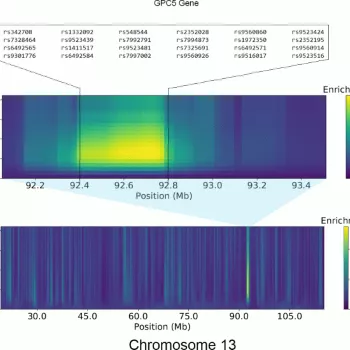
Marla Mendes, a former PhD co-supervised by Dr. Esteban Parra and now a postdoc at the University of Toronto, has published an article in the journal Plos One (Identifying signatures of natural selection in Indian populations) describing genomic regions that may have been under positive selection in Indian populations. (Posted September 20, 2022)
Dr. Esteban Parra and a former UTM undergraduate student, Phuong Le, are co-authors of an article recently published in the American Journal of Human Genetics. This article, in collaboration with numerous researchers throughout the world, provides interesting insights on regulatory mechanisms that are relevant in lipid biology. (Posted September 20, 2022)
Dr. David Samson and colleagues recently published an article in the journal Social Science & Medicine (Links between household and family social dynamics with sleep profiles among BaYaka foragers of the Congo Basin). The results highlight the importance of local socio-ecological conditions to sleep. (Posted September 20, 2022)
In collaboration with University of Toronto Mississauga Biomedical Communications Program (Marc Dryer), MSc student Michelle (Michie) Wu, for her final thesis project, has created a novel and invaluable teaching aid for the Forensic Science Program and the forensic genetics community on the topic of DNA mixture deconvolution. The video has been published online via free access on YouTube. (Posted August 22, 2022)
Co-authored by doctoral students Rachel Shadoff and Mary-Anne Panoyan, Dr. Nicole Novroski published a comprehensive review on the state of Microbial Forensics, with an emphasis on bioinformatic analyses, in Forensic Genomics. For both Rachel and Mary-Anne, this manuscript is their inaugural publication as academic scholars. (Posted August 22, 2022)
Via invitation from the journal, Dr. Nicole Novroski was appointed Editor-in-Chief of Forensic Genomics, the exclusive journal of ISHI (International Symposium on Human Identification). View the formal announcement of Dr. Novroski's appointment. (Posted August 22, 2022)
Stephen Scharper co-presented with Hilary Cunningham at the Harvard Divinity "Ecological Spiritualities" Conference. The topic was "Sanctuary for all Lives: Sustainability and the Sacred in a Refugee Context". (Posted August 19, 2022)
Disorders with internalizing symptoms (such as PTSD, anxiety, and depression) show stark sex differences in symptom patterns, age of onset, and comorbid or co-occurring conditions. One such co-occurring personality trait is neuroticism, characterized by negative affect, anger, irritability, and emotional instability. Dr. Frank Wendt and colleagues recently identified sex-specific factors influencing neuroticism including potential biomarkers relevant for disorder status (Sex-specific genetic and transcriptomic liability to neuroticism - ScienceDirect). These findings contribute novel hypotheses for understanding the role of biological sex in the presentation, etiology, and relative risk of psychiatric disorders with neurotic symptoms. (Posted August 19, 2022)
Dr. Lauren Schroeder and colleagues recently published a paper in Scientific Reports entitled “Skull variation in Afro-Eurasian monkeys results from both adaptive and non-adaptive evolutionary processes”. This study illuminates how evolution has acted to shape skull diversity across Afro-Eurasian monkeys, which helps us better understand evolutionary relationships and can aid in addressing issues relevant to primate conservation. (Posted July 29, 2022)
Dr. Frank Wendt and colleagues recently published a large genetic study of opioid use disorder in the journal Molecular Psychiatry. Their study focused on individuals of European and African ancestry and used multi-trait analysis of opioid use disorder to identify 19 independently associated loci and associated biological underpinnings of OUD. (Posted July 26, 2022)
Dr. Larsen published a co-authored article in the The Lancet Psychiatry, entitled, "More phenomenology in psychiatry? Applied ontology as a method towards integration". In this piece, the authors outline a novel method on how to capture data about "first-person experiences" in mental health research. The challenge of including data about first-person experiences in research efforts is a long-standing issue that has yet to be sufficiently resolved, but also a challenge that, if mitigated, has the potential to propel research innovation and expand our knowledge about mental health diagnostics, causation, treatment, etc. (Posted July 15, 2022)
Dr. Frank Wendt was a runner-up for UK Biobank Early Career Researcher of the Year for his work associating tandem repetitive elements with phenotypic outcomes in 150,000 individuals. This work was presented at the 2022 UK Biobank Scientific Conference and informs many future studies of genetic factors influencing with health, behavior, and disease. (Posted July 15, 2022)
Dr. Frank Wendt is the recent recipient of a conference travel award from the International Society of Psychiatric Genetics Early Career Investigator Program. He will attend the World Congress of Psychiatric Genetics meeting in Florence, Italy to present his work linking empathy and childhood maltreatment to posttraumatic stress. This work will be presented as part of a collaborative symposium with leading PTSD researchers from around the world. (Posted July 15, 2022)

Dr. Frida Lona-Durazo, a former graduate student in Dr. Esteban Parra’s group, has recently published a paper in the journal iScience. The article describes the genetic architecture of eye colour in a large Canadian cohort of European ancestry. This research uncovered several candidate causal variants responsible for the fascinating diversity of eye colour in human populations. The article also explored the potential role of gene expression and DNA methylation on eye colour variation. (Posted July 14, 2022)
Some of the research on pottery that archaeologist Dr. Alicia Hawkins and colleagues have been doing for the last five years is now on display in a temporary exhibit at the Huron-Wendat Museum in Wendake, Quebec. The exhibit will be displayed starting July 7, 2022. (Posted July 14, 2022)
Remote, northern communities face unique challenges with the adoption of renewable energy. Dr. Tracey Galloway is working closely with community partners in Yukon and Northern Ontario that are considering stationary and mobile energy solutions designed to work well in cold climates. This community-informed, northern focus is a key element of a new NSERC CREATE training platform based at the University of Toronto’s Faculty of Applied Science & Engineering and led by Dr. Cristina Amon. The new CREATE platform is featured this month in UofT Engineering News. (Posted June 15, 2022)
Dr. Esteban Parra is one of the senior authors of a recent study describing the results of a genome-wide association study (GWAs) of anthropometric traits (body mass index, height, and BMI-adjusted waist-to-hip ratio) in a large Hispanic/Latino sample, which was recently published in the journal HGG Advances. This research uncovered several novel genetic variants associated with these traits. (Posted May 17, 2022)
Dr. Esteban Parra and his Mexican colleagues participated in a comprehensive study of the genetics of type 2 diabetes (T2D), which included more than 180 thousand affected individuals and 1.1 million controls of diverse ancestry. The results of this large-scale collaborative research were published in the prestigious journal Nature Genetics. This ambitious study identified hundreds of genetic markers increasing T2D risk and showed that the inclusion of samples from diverse populations resulted in enhanced fine-mapping resolution and better transferability of T2D prediction scores across populations. (Posted May 17, 2022)
UTM Anthropology was well represented at the recent Canadian Archaeological Association annual conference held as a hybrid conference, with both online components and in-person components in Edmonton, AB, which took place from April 27th to 30th, 2022. Several of our undergraduate students contributed virtual posters to the conference: Mahalia Johnna Baguio and Ya Qi Mo contributed a poster titled (Re-)Imagining the Schreiber Wood Landscape: Digital Reconstructions of 19th Century Settler Occupations at the University of Toronto Mississauga, and Yunfei Lin and Kiara Kim contributed a poster titled 3D Reconstruction of a Cultural Landscape: Interpreting Shadowmere of the Schreiber Estate. The poster by Mahalia and Ya Qi was recognized as the best undergraduate student poster presented at the conference. Dr. Alicia Hawkins and colleagues organized an online session that explored the theme of Making Small Changes to Investigate Big Ideas: Minimally Invasive and Non-destructive Analytical Approaches. This session included several papers with UTM co-authors: Dr. Trevor Orchard, Dr. Suzanne Needs-Howarth, Dr. Alicia Hawkins, and Dr. Louis Lesage presented a paper titled Faunal Analysis without Getting Our Hands Dirty: Meta-Analysis of Legacy Zooarchaeological Data from the Lower Great Lakes; Tyaibah Biswas, a UTM undergraduate student, along with Trevor Orchard and Alicia Hawkins presented a paper titled Big Fish, Small Fish: Exploring Wendat Fishing Practices through Osteometric Analysis of Yellow Perch Remains; Dr. Gregory Braun, along with his co-author Dr. Amy St. John, presented a paper titled Technological choices past and present: minimizing destructive analyses in pottery studies. (Posted May 2, 2022)
Dr. Madeleine Mant was awarded the annual John Armstrong Prize by the British Commission for Maritime History for her paper "For those in peril on and off the sea: Merchant marine bodies in nineteenth-century St. John’s, Newfoundland", published in the International Journal of Marine History. The John Armstrong Prize is awarded annually for "the best article in the field of maritime economic history published in any peer-reviewed, scholarly journal during the previous year". (Posted April 28, 2022)
Dr. Sherry Fukuzawa was awarded 2021-22 Early Career Teaching Award and Teaching Fellowship at U of T. Dr. Fukuzawa is currently involved in research "investigating ways to utilize technology to implement problem-based learning experiences across disciplines. She is also a founding member of the Indigenous Action Group (IAG) where she fosters and facilitates community-engaged learning (CEL) and community-initiated research (CIR) in partnership with the Mississaugas of the Credit First Nation." (Posted April 28, 2022)
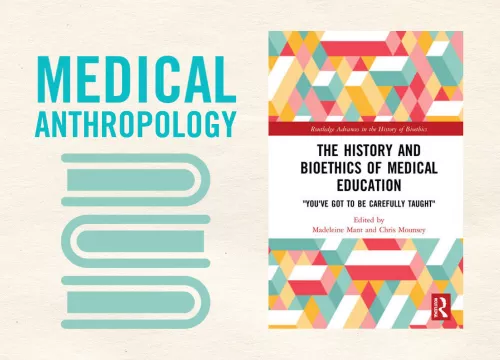
The History and Bioethics of Medical Education "You've Got to Be Carefully Taught", co-edited by Dr. Madeleine Mant, is included in this year's annual Celebration of Books at UTM. (Posted April 7, 2022)
Dr. Alicia Hawkins, Dr. Trevor Orchard, Dr. Suzanne Needs-Howarth and colleagues published a study of intra-analyst variation in the identification of zooarchaeological specimens in the International Journal of Osteoarchaeology. They demonstrate that analyst experience is an important contributor to accurate taxonomic and skeletal element identification and provide recommendations to improve training of novice analysts. (Posted March 28, 2022)
Professor Stephen Scharper authored a book chapter "From Creation Chaos to Creaturely Solidarity: The Comingling of Faith and the Fate of the Earth" in For the Sake of the Common Good: Essays in Honour of Lois Wilson, McGill-Queens University Press, 2022. (Posted March 21, 2022)
Dr. Alicia Hawkins and colleagues recently co-edited the special issue of the Canadian Journal of Archaeology, focusing on Current Archaeology of the Huron-Wendat and St. Lawrence Iroquoians. The issue features several UTM and U of T authors and co-authors. (Posted January 31, 2022)
Dr. Alicia Hawkins and colleagues published “Nueva Cádiz” in the Americas: A Preliminary Compositional Comparison of Layered Beads from the 16th and 17th Centuries Beads in the Journal of the Society of Bead Researchers. Link to full text (PDF) through ResearchGate. (Posted January 31, 2022)
Drs. Tracey Galloway and Sarah Hillewaert are part of a UTM-led team that was recently awarded $199,000 for their project “Understanding the COVID-19 Journeys and Vaccine Experiences of Racialized and Immigrant Communities in the Greater Toronto Area”. The project team includes Undergraduate and Graduate students from UTM who are analyzing COVID-19 case and vaccination data and conducting interviews with people living in Mississauga, Brampton and Caledon. The team is co-led by Dr. Galloway along with Drs. Matthew Adams and Kathi Wilson, UTM Department of Geography, Geomatics & Environment, and is supported by colleagues from Anthropology, Geography, Geomatics & Environment, Historical Studies, and the Dalla Lana School of Public Health. Community partners include the Newcomer Centre of Peel, the Centre for Connected Communities, Peel Region Public Health and Trillium Health Partners’ Institute for Better Health. (Posted January 19, 2022)
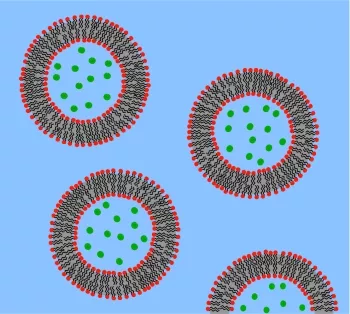
Dr. Esteban Parra and his colleagues from Mexico are co-authors of a very large study of the genetics of blood lipid levels including hundreds of scientists throughout the world. The results of this study have been published in the prestigious journal Nature. The sample included approximately 1.65 million individuals, including 350,000 of non-European ancestries. The study identified many novel genetic variants influencing blood lipid levels (LDL-cholesterol, HDL-cholesterol, triglycerides, total cholesterol, and non-HDL-cholesterol). Importantly, the study highlights the importance of including diverse populations in Genome-Wide Association Studies (GWAS). The authors of the study reported that increasing diversity resulted in improvement of fine-mapping efforts to identify putative functional variants, and the transferability of lipid concentration predictions using Polygenic Risk Scores (PRS) to multiple population groups. (Posted January 18, 2022)
Professor Sarah Hillewaert published an article in the latest issue of the Journal of Linguistic Anthropology, in honour of Judith Irvine. The article is called: Reimagining Linguistic Heritage: Or How Mother Tongue Speakers Re‐create Their Language. (Posted January 18, 2022)
Professor Sarah Hillewaert co-edited the special section for the latest volume of Religion and Society. Dr. Hillewaert co-authored the introduction to the special section, and contributed an article as well. The introduction’s title is: Communities Reimagining Sharedness in Belief and Practice. Dr. Hillewaert's article is Discourses, Bodies, and Questions of Sharedness in Kenya’s Wellness Communities. (Posted January 18, 2022)
2021
Dr. Firat Bozcali's 2020 article "Probabilistic borderwork: Oil smuggling, nonillegality, and techno‐legal politics in the Kurdish borderlands of Turkey" in the journal American Ethnologist received the Best Article in Kurdish Studies Award given annually by the Kurdish Political Studies Program at the University of Central Florida. Dr. Bozcali was praised for his article, with the award committee noting, "Bozcali brings a refreshing perspective about how ordinary people engage in cross-border economic activities while aiming to avoid charges of smuggling. Based on 20 months of ethnographic fieldwork in judicial and commercial settings, Bozcali demonstrates how the state’s attempts to curtail oil smuggling via the adoption of new technologies are effectively challenged by Kurdish traders and lawyers." (Posted December 4, 2021)
A new paper from Dr. Lauren Schroeder’s Lab group, entitled “The hybrid skull of the eastern coyote (Canis latrans var.): Nonmetric traits and craniomandibular shape” was recently published in the Journal of Morphology. The study, led by Master of Science graduate, Natasa Zdjelar, examines how hybridization has influenced skull morphology in the eastern coyote or “coywolf”. Results support the proposal of a common skeletal signature representing mammalian hybridization. Read more about the study in UofT News. (Posted November 30, 2021)
Dr. Lauren Schroeder published a review article entitled “Factors shaping the evolution of early Homo.” in the Wiley Reference work eLS. This contribution discusses up-to-date research relating to our current understanding of the evolutionary processes underlying morphological variation during the early evolution of our genus. (Posted November 30, 2021)
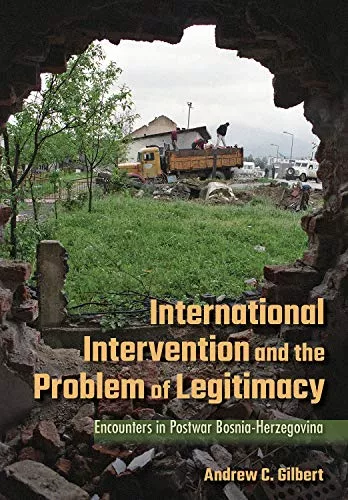
Dr. Andrew GIlbert presented his book on ethnographic analysis "International Intervention and the Problem of Legitimacy: Encounters in Postwar Bosnia-Herzegovina" (Cornell University Press, 2020) at a talk and Q&A session hosted by the Centre for International Policy Studies (CIPS) at the University of Ottawa. To watch Dr. GIlbert's book talk, please see CIPS's YouTube channel. (Posted November 20, 2021)
Dr. Zoë H Wool launched her lab, the Toxicity, Waste and Infrastructure Group (TWIG) Research Kitchen, Thursday, November 11th, 2021. The TWIG Research Kitchen is a feminist research space for experiments in research on toxicity, waste, and infrastructure across the social sciences and humanities. You can view the website here. There are currently three research projects housed in the kitchen, and a slate of ongoing events exploring what convivial scholarship can look like. This includes the "collabowrite" wander + wonder + write sessions, in which faculty and postdocs are offered protected time to think and write with colleagues. You can learn more here. (Posted November 17, 2021)
Dr. Madeleine Mant and her colleague Dr. Samantha Cutrana (York University) recently published their pedagogical research in FACETS on postpademic teaching and learning approaches. The report "Navigating a defining moment: COVID-19 and curatorial thinking" discusses the Defining Moments Canada/Moments Déterminant Canada-supported curatorial thinking teaching strategy —Selecting, Archiving, Sense-Making, and Sharing (SASS) – which helps “learners orient themselves in place and time”. The article provides examples of curatorial thinking projects related to the 1918 influenza pandemic and the history of insulin. These projects ask students to engage with the content by producing an assignment or “unessay” using media of their choosing, which can include podcasts, infographics, short films, games, poetry, paintings, rap songs, embroidery, and everything in between. (Posted November 15, 2021)

Dr. Frida Lona Durazo, a former graduate student in Dr. Esteban Parra's group, currently working as a postdoctoral fellow at Université de Montréal, recently published a paper in the journal Communications Biology. In this article, Dr. Lona Durazo and her colleagues studied the genetic architecture of hair colour in a large Canadian sample including approximately 13,000 individuals of European ancestry. The study points to putative causal variants associated with different hair tones, and also explores potential mechanisms regulating hair pigmentation variation. The article has been covered broadly in the press and social media, including a contribution to The Conversation. (Posted November 13, 2021)
Dr. Stephen Scharper presented on environmental ethics, ecological challenges and liberation theology as an invited panelist for the Toronto School of Theology's September 30th forum "Climate Privilege, Recism, Vulnerability: Questions for theological reflections". For more on the event, please see Regis College's site. (Posted November 13, 2021)
Professor Andrew Gilbert just published an article in Anthropology News with fellow anthropologist Dr. Larisa Kurtović (uOttawa) and Sarajevo-based graphic artist Boris Stapić. Entitled “Reclaiming Dita,” the article is part of a special collection that focuses on innovations in graphic ethnography, or ethnographic research that appears in the form of sequential art like comics or graphic novels. The article highlights some of the unique advantages and possibilities of working collaboratively in this medium. Dr. Gilbert also recently presented research from this graphic ethnography project on 22 July at the workshop “Anthropology beyond text? Experiments, devices and platforms in multimodal anthropology” organized by the Stadtlabor for Multimodal Anthropology at the Institute for European Ethnology, Humboldt University, Berlin. (Posted August 31, 2021)
Dr. Lauren Schroeder and Cathy Ngọc Hân Tran published an article entitled “Common evolutionary patterns in the human nasal region across a worldwide sample” in the American Journal of Physical Anthropology. This article uses a quantitative genetic approach to assess whether the variation in the external nasal region of humans can be attributed to genetic drift or natural selection. Results highlight a strong adaptive signature in the nasal region across all populations, challenging the long-standing hypothesis that nasal adaptation occurred only across cold-climates. (Posted August 23, 2021)
Dr. Madeleine Mant and her team published more results of their U of T COVID-19 Action Initiative funded research on U of T student experiences of the ongoing pandemic in PLOS ONE. While the majority of university students stated their intention to get the COVID-19 vaccine, they noted nuanced concerns about efficacy and safety that must be taken into account by public health authorities. Ensuring that family doctors, pharmacists, and other front-line healthcare workers have consistent and clear information regarding the benefits of vaccination will be critical to encouraging uptake among young adults. (Posted August 18, 2021)
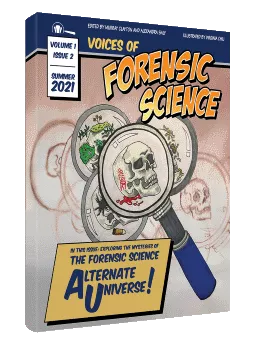
Volume 1, Issue 2 of Voices of Forensic Science is now published! Authored by the summer students of FSC430, this book is a collaborative exploration of forensic issues from a multidisciplinary approach. The summer issue, titled The Forensic Science Alternate Universe explores hypothetical changes to infamous crimes, and how the ripple effects of these alternate timelines extend far beyond just the suspect and victims. Edited by forensic instructor Murray Clayton and anthropology PhD Candidate Alex Saly, this marks the second publication for FSC430. (Posted August 18, 2021)
Dr. David Samson published an article entitled “The Human Sleep Paradox: The Unexpected Sleeping Habits of Homo sapiens” in the Annual Review of Anthropology. Sleep is vital for optimal performance. Why then, do humans sleep the least of all primates? To reconcile, Dr. Samson proposes the Social Sleep Hypothesis, which he outlines briefly in this Twitter thread. (Posted July 19, 2021)
Dr. David Samson and colleagues published Gender differences in BaYaka forager sleep-wake patterns in forest and village contexts in Scientific Reports. Sleep studies in small-scale subsistence societies have broadened our understanding of cross-cultural sleep patterns, revealing the flexibility of human sleep. This paper examines sleep biology among BaYaka foragers from the Republic of Congo who move between environmentally similar but socio-ecologically distinct locations to access seasonal resources. The authors highlight the importance of considering intra-cultural variation in sleep–wake patterns when taking sleep research into the field. (Posted July 9, 2021)

Professor Todd Sanders and Professor Elizabeth Sanders (Dalla Lana School of Public Health, University of Toronto) presented a paper on the panel Beyond audit culture? New critical approaches to accountability, responsibility and metrics at the 15th Congress of the International Society for Ethnology and Folklore (SIEF), University of Helsinki, Finland on 23 June. Drawing on materials from their current SSHRC-funded project, their paper – The power of accountability: reflections on fracking, traffic lights and openness in England – explored some of conundrums that familiar anthropological approaches to audit and accountability create for understanding such phenomena today, and suggested one possible way to extend anthropological thinking and theorising on the subject. (Posted July 7, 2021)
Dr. Trevor Orchard, along with his collaborators Suzanne Needs-Howarth, Alicia Hawkins, Louis Lesage, Eric Guiry, and Thomas Royle, recently presented a paper titled “A feathered river across the sky? Preliminary considerations of passenger pigeon abundance and distribution in the late Holocene zooarchaeological record of southern Ontario, Canada” at the 10th Meeting of the International Council for Archaeozoology Bird Working Group. The two day conference, hosted by staff of the Osteological Collections, University Museum of Bergen, Norway, was held online, June 5-6, 2021. (Posted June 8, 2021)
Dr. Trevor Orchard, along with collaborators Alicia Hawkins, and Suzanne Needs-Howarth, presented a paper on “Mining Howard Savage’s Legacy: Assessing Zooarchaeological Data Quality in Undergraduate Student Faunal Reports” at the the Second Faunal Interest Group Symposium: Zooarchaeology Beyond Food, hosted by the University of Toronto Archaeology Centre. The symposium was held online, in March 2021. (Posted June 8, 2021)
Dr. David Samson, Kaleigh Reyes, and Ujas Patel published Gibbon sleep quantified: the influence of lunar phase and meteorological variables on activity in Hylobates moloch and Hylobates pileatus in the journal Primates. This article reports the first sleep duration estimates in two captive gibbon species, the Javan gibbon (Hylobates moloch) and the pileated gibbon (Hylobates pileatus). (Posted May 31, 2021)
Drs. Tracey Galloway and Sarah Hillewaert, along with a team of researchers and health service providers from Peel Region Public Health and Trillium Health Partners, have received a pilot research award from the inaugural UTM Black, Indigenous, and Racialized Scholar/Research Grant Program. Their project Racialized, Migrant and Indigenous Community Experiences of the COVID-19 Pandemic in Peel Region will use spatial and qualitative methods to understand the “COVID-19 journeys” of racialized, immigrant and Indigenous communities in order to increase the awareness and cultural safety of health messaging and care. The interdisciplinary team includes Drs. Kathi Wilson (co-lead), Matt Adams, Vincent Kuuire and Nicole Laliberte (UTM Geography, Geomatics & Environment), Dr. Nicole Charles (UTM Historical Studies), and Drs. Laura Rosella and Rob Reid (Dalla Lana School of Public Health and Trillium Health Partners). (Posted May 26, 2021)
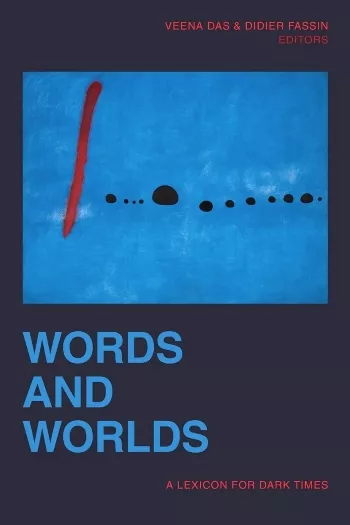
Professor Todd Sanders and Professor Elizabeth Sanders (Dalla Lana School of Public Health, University of Toronto) contributed a chapter on ‘Openness’ to Words and Worlds: A Lexicon for Dark Times (eds) Veena Das & Didier Fassin. Durham, NC: Duke University Press. The volume, which resulted from a workshop at the Institute for Advanced Study, Princeton, uses a keyword approach à la Raymond Williams in order to provide a partial diagnosis of today’s troubled times. If Elizabeth Povinelli is right, the collection ‘will have a major impact on our thinking about the fate of liberalisms and democracy.’ (Posted May 25, 2021)
Professor David Samson and his lab team recently launched the Sleep and Human Evolution Lab (SHEL) website. SHEL focuses on the biology, ecology, and evolution of primate sleep. The SHEL's ultimate goal is to further our understanding of the evolutionary links between sleep, health, and cognition in the human lineage. Visit the new SHEL website to learn more! (Posted May 7, 2021)
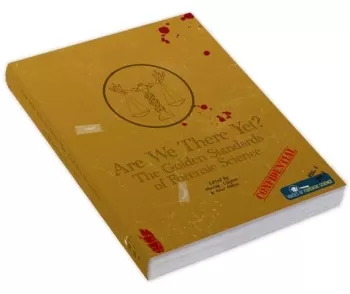
The students of FSC430 recently published the inaugural volume and issue of Voices of Forensic Science, a collaborative exploration of forensic issues from a multidisciplinary approach. This issue, titled Are We There Yet? The Golden Standards of Forensic Science is edited by forensic instructor Murray Clayton and anthropology Master’s student Noor Abbas, and looks at the weight and consequences of holding methods and techniques in high regard, and what happens when trust in science is not critically evaluated. (Posted April 27, 2021)
 Books by Stephen Scharper, Sarah Hillewaert, and Andrew Gilbert were included in the annual Celebration of Books at UTM.
Books by Stephen Scharper, Sarah Hillewaert, and Andrew Gilbert were included in the annual Celebration of Books at UTM.
Learn more about The Green Bible: Words of Love for A Suffering Planet by Stephen Scharper and Simon Appolloni, Morality at the Margins: Youth, Language, and Islam in Coastal Kenya by Sarah Hillewaert, and International Intervention and the Problem of Legitimacy: Encounters in Postwar Bosnia-Herzegovina by Andrew Gilbert. (Posted April 27, 2021)
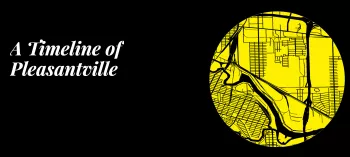
Professor Wool co-created a media-rich timeline exhibit at the Houston Flood Museum detailing the history of Black civic engagement and environmental racism in Houston's historic Pleasantville neighborhood. The timeline is the first output of Project Pleasantville, a community collaborative team project founded in 2019 by Professor Wool, along with Dr. Lacy Johnson, Ms. Bridgette Murray, and Mr Cleophus Sharp. The project also includes a growing oral history archive, a poster series, and a number of student research projects. (Posted April 26, 2021)
Dr. Rosenberg Larsen published a co-authored article in the journal, Frontiers in Psychology, entitled, "Is the Psychopathic Brain an Artifact of Coding Bias? A Systematic Review". In this piece, the authors systematically review the neurobiological evidence behind the claim that diagnosed psychopaths have abnormal/different brain structures. Specifically, they analyzed the proportion of null-findings compared to positive effects in sMRI brain imaging experiments. They found that the majority of results are null-findings, but that review studies consistently under-report nulls and disproportionately includes positive findings, distorting the robustness and true relevance of this evidence. The authors conclude that there is a pressing problem with coding bias in the field, which in turn has negative implications for its current and future forensic use. (Posted April 26, 2021)
Dr. Madeleine Mant and colleagues published an article entitled Canadian university students' perceptions of COVID-19 severity, susceptibility, and health behaviours during the early pandemic period in the journal Public Health in Practice. This is an open access article based upon Dr. Mant's U of T COVID-19 Student Survey project. (Posted April 26, 2021)
Dr. Madeleine Mant is a Series Editor of the Routledge Advances in the History of Bioethics series. She co-edited the most recent volume: The History and Bioethics of Medical Education "You've Got to Be Carefully Taught". (Posted April 26, 2021)
Dr. David Samson, PhD candidates Erica Kilius and Leela McKinnon, and Master's student Noor Abbas published Pandemic Nightmares: COVID-19 Lockdown Associated With Increased Aggression in Female University Students' Dreams in Frontiers in Psychology. The COVID-19 pandemic and its associated stressors have impacted the daily lives and sleeping patterns of many individuals, including university students. Dreams may provide insight into how the mind processes changing realities. We found that relative to normative American College Student (ACS) samples generated pre-COVID-19, women were more likely to experience aggressive interactions in their dream content, including increased physical aggression. Results indicate that university students did experience changes in dream content due to the pandemic lockdown period, with women disproportionally affected. These findings can aid universities in developing support programs for students by bringing forth an understanding of students' concerns and anxieties as they process the “new normal” of social distancing. (Posted March 23, 2021)
Dr. Steven Dorland recently published an article entitled Let's start with something Small: An evaluation of social learning and scaling practices in Great Lakes potting communities during the Late Woodland in the Journal of Anthropological Archaeology. The paper analyses decorative data from Late Woodland ceramic assemblages to investigate scaling practices and its role in learning experiences. This paper proposes a methodology to strengthen understanding of social learning traditions in the Great Lakes that is applicable across spatiotemporal contexts. (Posted March 22, 2021)
Professor Andrew Gilbert recently created a podcast entitled “An Anthropology of…” for the Raising Our Voices virtual event series of the American Anthropological Association last November. The podcast was only available for registered participants, but is now available for anyone to listen to here. Here is a description of the episode:
“Among the most common phrases to appear in anthropological scholarship is “an anthropology of…” But the objects of this phrase differ wildly. A simple search of anthropology journals shows scholars proposing an anthropology of, variously: labor, landmines, culpability, old age, lying, parking, the multimodal, viral hemorrhagic fevers, algorithms, electricity, interior dialogue, immunology, public reasoning, and undesired buildings. With such an array of different research objects can the authors mean the same thing by what constitutes “anthropology”? Or is this turn of phrase simply a useful way to distinguish ourselves in a competitive academic market and add intellectual heft to our scholarly endeavors? Drawing on interviews with a diverse group of anthropologists, this podcast takes this phrase as a starting point to offer a playful and contemplative exploration of how the discipline understands itself today. Featuring Akhil Gupta, Kate Hennessy & Trudi Lynn Smith, Eleana Kim, Carole McGranahan, Tobias Rees and Nick Seaver.” (Posted January 25, 2021)
Professor Andrew Gilbert recently participated in an Emergent Conversation series entitled “Political Action and Generations” for Political and Legal Anthropology Review (PoLAR), the journal of the Association for Political and Legal Anthropology. View part one and part two. (Posted January 25, 2021)
Dr. Guilherme Debortoli, a postdoctoral researcher in Prof. Esteban Parra’s lab, and collaborators from Brazil and Sweden published in the journal Scientific Reports an article entitled “Identification of ancestry proportions in admixed groups across the Americas using clinical pharmacogenomic SNP panels”. This article evaluated the performance of three panels of pharmacogenetic (PGx) markers to estimate biogeographic ancestry, and described that using these panels it is possible to control for the effects of population stratification (e.g. false positive results) in association studies in recently admixed populations. (Posted January 20, 2021)
Dr. Madeleine Mant's article entitled Intersectionality and trauma analysis in bioarchaeology has been accepted to the American Journal of Physical Anthropology. (Posted January 15, 2021)
March 4, 2021 update: Dr. Mant's article "Intersectionality and trauma analysis in bioarchaeology" was selected as the Editor's Choice article for the April issues of American Journal of Physical Anthropology. The article is available for free for the next few months at https://onlinelibrary.wiley.com/doi/10.1002/ajpa.24226.
2020
Dr. David Samson and colleagues teamed up to study canine sleep-wake patterns. The study of companion (pet) dogs is an area of great translational potential, as they share a risk for many conditions that afflict humans. Their paper, entitled "A functional linear modeling approach to sleep–wake cycles in dogs", has been published in Scientific Reports. (Posted December 17, 2020)
Professor Liye Xie has been awarded the UTM Annual Research Prize in the Social Sciences for her outstanding contributions to the study of the impact of technology on society with an emphasis on preindustrial technologies such as bone, stone, and earthen construction. (Posted December 17, 2020)
Prof. Stephen B. Scharper particpated in "Our Climate Emergency and COVID-19: Crises of the Spirit". This online dialogue presented an opportunity to examine our climate change emergency amidst the current global pandemic. A recording of the event is available on YouTube. (Posted December 11, 2020)
Tracey Galloway and colleagues from the Waakebiness-Bryce Institute published a commentary in the International Review of Education: "Education in uncertainty: Academic life as Indigenous health scholars during COVID-19". The article explores the impact of the pandemic on the training and work experiences of graduate students, emerging and established scholars, along with the communities with which their research engages. (Posted December 11, 2020)
Dr. David Samson recently published "Taking the sleep lab to the field: Biometric techniques for quantifying sleep and circadian rhythms in humans" in the American Journal of Human Biology. The article outlines the procedures and methods for generating sleep data in a broader ecological context with the goal of facilitating the integration of sleep and circadian analyses into human biology research. (Posted December 10, 2020)
Dr. Trevor Orchard and colleagues have just published an article in the journal American Antiquity, exploring “Isotopic evidence for garden hunting and resource depression in the Late Woodland of Northeastern North America”. (Posted November 17, 2020)
Dr. Michael Brand, Dr. Trevor Orchard, and PhD candidate Sarah Ranlett recently published a short reflection piece in the Fall 2020 issue of the Society for American Archaeology’s Heritage Values Interest Group Newsletter (page nine), considering the challenges we faced running the UTM archaeological field school and the accompanying collections-based work study program under the restrictions imposed by the ongoing Covid pandemic. (Posted November 13, 2020)
Anthropology at UTM, and UofT more broadly, was very well represented at the Ontario Archaeological Society Virtual Symposium (Nov. 6-8, 2020). At the annual awards ceremony, held on the evening of Friday, Nov. 6, Dr. David Smith, Associate Professor in UTM Anthropology, was awarded the Helen Devereaux Award for excellence in archaeological mentoring. On Saturday morning, Dr. Trevor Orchard organized and chaired a session entitled New Insights from Old Collections: The Research Potential of Legacy Collections in Ontario Archaeology. This session, containing eleven presentations on diverse aspects of working with legacy archaeological collections throughout the province, included papers by: Yasmine Vella and David Smith (Using Legacy Collections at University of Toronto Mississauga for Undergraduate Research); Trevor Orchard and colleagues (Collaborative Research with Legacy Collections: Ongoing Zooarchaeological Research at the University of Toronto Mississauga); Steven Dorland, Trevor Orchard, and their collaborators (Looking for Children in the Zooarchaeological Record: A Holistic Investigation of Childhood Subsistence in Northern Iroquoian Communities); and Kaitlyn Malleau (Whose Collection, Whose Legacy? Why Community-Based Research Just Makes Good Science). A virtual poster session on Saturday afternoon, chaired by Sarah Ranlett, included a series of four posters by UTM students, faculty, and staff exploring ongoing research on collections generated by the Shreiber Wood Project, which encompasses both the annual UTM Anthropology archaeological field school and the ongoing departmental work study program. This session included posters and presentations by: Sarah Ranlett, Michael Brand, and Trevor Orchard (Facilitating Student Research on Field School Collections); Natasa Zdjellar, Cinda Johnson, S. Ranlett, M. Brand, and T. Orchard (Ceramic Assemblage and Decorative Typology); Mahalia Johnna Baguio, C. Johnson, S. Ranlett, M. Brand, and T. Orchard (Life at a Glance as Seen through Ceramics); and Andrew Dasilva Furtado, S. Ranlett, M. Brand, and T. Orchard (Playing through History). Finally, Sunday morning saw a session organized and chaired by Dr. Gregory Braun that explored the topic of Technology and Its Relations, and included a paper by Tiziana Gallo (Relations of Stone: Expanding Huron-Wendat Ground Stone Celts' Biographies). (Posted November 9, 2020)
November 17, 2020 update: Yasmine Vella has received the award for the best overall student paper given at the symposium, for her paper co-authored with Dr. David Smith. And, Mahalia Baguio has received the award for the best overall student poster presented at the symposium.
Dr. Madeleine Mant published a piece entitled "Remember to forget: Pandemic research during a pandemic" about the about her COVID-19 student survey project in the online medical humanities journal Synapsis. (Posted November 6, 2020)
Dr. Madeleine Mant published a piece entitled "Health histories on the rock" for the University of Toronto Press blog about her recent Canadian Bulletin of Medical History paper (Inpatients at the St. John’s General Hospital: Morbidity in Late 19th-Century Newfoundland and Labrador). Readers can access a free download of the paper at the end of the blog article. (Posted November 5, 2020)
Dr. Rosenberg Larsen published an article in the Journal, Mind & Language, entitled, "Are psychopaths moral‐psychologically impaired? Reassessing emotion‐theoretical explanations". In this piece, Dr. Larsen reconsiders whether our current understanding of psychopathic personality is valid, arguing that many of the current theories are not necessarily meaningfully construed. He considers alternative and novel explanations of psychopathy, theorizing that psychopaths may exhibit a degree‐specific emotional deficiency, which causes degree‐specific differences in moral judgments. While this theoretical version may be sound, it raises new ethical concerns for how psychopaths are managed in the legal system.(Posted October 27, 2020)

As part of the Royal Society of Canada’s Annual Celebration of Excellence and Engagement, Dr. Tracey Galloway will take part in a University of Toronto virtual symposium celebrating the 100th anniversary of the discovery of insulin. The panel event (Thursday, November 26, 2020) exploring the public health experiences of Indigenous people with Type 2 Diabetes will be moderated by historian Dr. Ian Mosby, Ryerson University and include presentations by Dr. Jon McGavock, University of Manitoba, and Dr. Suzanne Stewart, Waakebiness-Bryce Institute, Dalla Lana School of Public Health. Register here for this informative event. (Posted October 19, 2020)
Dr. Vivek Goel (Dalla Lana), Dr. Jia Xue (Faculty of Social Work, Faculty of Information), and Dr. Madeleine Mant (Anthropology) are panelists at the Keith Davey Forum on Public Affairs on October 21, 2020. The topic is COVID-19 and its effect on public life. The Keith Davey Forum on Public Affairs is named in honour of former senator Keith Davey in recognition of his contribution to public life. The first lecture was held in 1997 and the inaugural speaker was John Kenneth Galbraith. Since this inaugural lecture, the forum has provided students, alumni, and the broader community with opportunities outside of the classroom to learn and engage in discussion about issues of great importance to all of us as global citizens. (Posted October 19, 2020)
Dr. Madeleine Mant has published a paper entitled Inpatients at the St. John's General Hospital: Morbidity in Late 19th-century Newfoundland and Labrador in the Canadian Bulletin of Medical History. Dr. Mant’s research analyzes the role of the St. John’s General Hospital in late nineteenth-century Newfoundland and Labrador using extant admission and discharge records from 17 May 1886 to 30 December 1899. (Posted October 8, 2020)
Dr. Kalyan Sekhar Chakraborty (postdoctoral fellow and recent PhD graduate) led research by a team including Prof. Greg Slater from McMaster University, Heather M.-L. Miller from the department of Anthropology, University of Toronto Mississauga, and senior archaeologists from India, which has been published in Nature’s Scientific Reports research journal. Their article “Compound specific Isotope analysis of lipid residues provides the earliest direct evidence of dairy product processing in South Asia” analyzed food residues absorbed in archaeological vessels from the Indus Civilization at a small site in Gujarat with strong connections to animal herding, the focus of Dr. Chakraborty’s PhD work and recent publications. This work is shedding new light on the animal products processed and consumed during the Indus period. (Posted October 5, 2020)
Steven Dorland recently published a paper on childhood learning practices in the Lower Great Lakes from CE. 900-1650. The paper, entitled Learning from Each Other: A Communities of Practice Approach to Decorative Traditions of Northern Iroquoian Communities in the Late Woodland, appears in the Journal of Archaeological Method. Traditionally, children prior to European contact are often assumed to have learned primarily through adult teaching in the Lower Great Lakes. This paper applies a ceramic analysis to shed new light on social learning and the role of child groups in maintaining longstanding traditions. (Posted October 5, 2020)
Leela McKinnon, Erica Kilius and Noor Abbas are graduate students in the lab of UTM anthropologist David Samson. Their new research delves into our unconscious minds, seeking to better understand the relationship between dreams and waking life. The results reveal intriguing insights about what might be happening in our nocturnal minds. Learn more and view the team's preliminary findings: COVID-19 and Sleep: How do dreams help us make sense of our new global reality? (Posted October 2, 2020)
Prof. David Samson has been awarded the prestigious John R. Evans Leaders Fund – Funding for research infrastructure from the Canada Foundation for Innovation (CFI) for the project “Sleep and Human Evolution Lab (SHEL): testing evolutionary hypotheses in a clinical, controlled space”. The award provides funding towards the building of a new sleep research laboratory, which will be the first of its kind in Canada and will incorporate unique technology such as a virtual reality rig to create different stimulus environments in order to see the effects on sleep. (Posted September 30, 2020)
Together with Dr. Farzaneh Hemmasi, an ethnomusicologist from the Faculty of Music (UTSG), Dr. Andrew Gilbert is part of a research team that was recently awarded a Connaught Community Partnership Research Award for a project entitled “Keeping Kensington “Kensington”: Value and Affordability in Toronto’s Kensington Market.” This two-year collaborative project between Ethnomusicology and the Ethnography Lab (St. George campus) aims to meet the resident-led activist organization Friends of Kensington Market (FOKM) and the Kensington Market Business Improvement Area’s (KMBIA) need for research on the complex interplay of value, (un)affordability, and culture that challenges this distinctive Toronto neighborhood. Faculty and graduate students in ethnomusicology and anthropology will conduct team ethnographic research and work collaboratively with FOKM and KMBIA to:
- document what community members consider to make their neighborhood unique, valuable and worth defending;
- identify and contextualize the forces that support or threaten that uniqueness;
- create innovative forms of knowledge that represent the complex stakes of the changes facing Kensington Market; and
- persuasively communicate those stakes and values to city representatives and other local decision makers in ways that lend themselves to actions, events, processes and relationships that advance the organizations’ goals.
This community-university partnership develops and galvanizes already-existing relationships initiated through the ongoing Kensington Market Research Project at the Ethnography Lab, where Dr. Gilbert is Senior Researcher. (Posted September 18, 2020)
Current Master's student Celine Moyen recently received a Mitacs Training Award (MTA), which facilitates experiential learning to develop research skill(s) over a 12- to 16-week period. Her proposed MTA project is to devise a standard protocol for correctly evaluating the specific elemental composition of human bone, by testing known samples and calibrating a correction factor for the Scanning Electron Microscope coupled with Energy Dispersive X-Ray Spectrometry (SEM-EDX). She will be comparing human bone to related compounds such as animal bone and shell, in order to refine the standards. This project will contribute to the completion of Celine's Master's Research Project which she is working under the direction of Dr. Tracy Rogers, as she aims to develop a protocol for evaluating the biological sex of unknown human skeletal remains found in forensic cases. Ultimately, SEM-EDX will be used to analyze the cortical microstructure and elemental composition of adult human femora to define sex differences. This technique has the capacity to assist in challenging cases involving fragmentary remains and contested cremains. (Posted September 18, 2020)
Professor Firat Bozcali recently published an article entitled "Probabilistic borderwork: Oil smuggling, nonillegality, and techno-legal politics in the Kurdish borderlands of Turkey" in the Journal of the American Ethnological Society. This article examines probabilistic borderwork, a deliberate counterstate political strategy in which Kurdish oil traders and their lawyers use scientific uncertainty to challenge smuggling charges, achieve nonillegality, and disrupt the state's border enforcement. (Posted September 18, 2020)
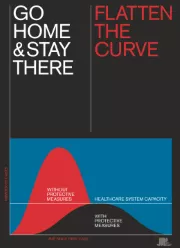
Professor Todd Sanders and Professor Elizabeth Sanders (Dalla Lana School of Public Health, University of Toronto) contributed “The Curve” to a Special Forum on COVID-19 in Social Anthropology/Anthropologie Sociale. In it, they consider what the curve is, how varied populations are working to “flatten” it, and some implications for anthropological thinking and theorising. (Posted September 18, 2020)
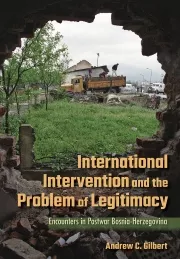
Dr. Andrew Gilbert recently published a book entitled International Intervention and the Problem of Legitimacy. Encounters in Postwar Bosnia-Herzegovina with Cornell University Press. Based upon many years of field research, the book foregrounds and analyzes the open-ended, innovative, and unpredictable nature of international intervention that is usually omitted from the ordered representations of governments and aid agencies, as well as the confident assertions of many critiques. In particular, the book identifies previously overlooked sites, processes, and effects of international intervention, and suggests new comparative opportunities for the study of transnational action that seeks to save and secure human lives and improve the human condition. (Posted September 18, 2020)
Dr. Andrew Gilbert was part of an international group of researchers that produced an experimental and multi-media panel entitled “How Do We Work Together? Distribution, Political Labor, and Worker Struggles in Bosnia and Herzegovina” for the pioneering virtual Distribute 2020 Conference of the Society for Cultural Anthropology and Society for Visual Anthropology. It featured, in part, Dr. Gilbert’s collaborative research project Reclaiming Dita, which uses the medium of sequential art (comics, graphic novels) to tell the story of the successful struggle of a group of Bosnian workers to save their factory from the effects of predatory privatization. (Posted September 18, 2020)
A new seminar series from the School of Cities examines community food security and health service access from a “supply chain” perspective. The series entitled “Building Resilience in Food & Health Supply Chains” is led by faculty from Engineering, Anthropology, Geography & Planning, and the Dalla Lana School of Health. The first event Oct. 5, will showcase Dr. Tracey Galloway’s research on food security issues in remote, Northern Indigenous communities in Canada. Register here for this event. (Posted September 18, 2020)
Dr. Tracey Galloway and colleagues recently published a digest paper exploring the bridges between evolutionary theory and the developmental origins of health and disease (DOHaD). The article is available in the journal Evolutionary Anthropology. (Posted September 18, 2020)
Dr. Rosenberg Larsen published a so-called Letter to the Editor in the journal, Philosophical Psychology, entitled: "More Than Provocative, Less Than Scientific: A Commentary on The Editorial Decision to Publish Cofnas (2020)". The article was co-authored with 8 colleagues, including Dr. Schroeder from UTM Department of Anthropology. In their Letter, the authors respond to a controversial, overtly racist article that was published in Philosophical Psychology in January, 2020. The Letter to the Editor explains why it was wrong to accept the racist article, moreover, why it should never have passed review due to its clear unscientific elements and morally repulsive rhetoric. The letter created substantial pressure on the journal's editorial board, which eventually led to the resignation of the editor-in-chief. The journal eventually pledged to diversify the editorial board and enhance scrutiny during review processes. Dr. Rosenberg Larsen is quoted saying that "this story sends an important message to our students about how – when academics are persistent – we can actually change our environment for the better; towards a more inclusive and diverse place reflective of the real world. An important step forward for philosophy and science." (Posted September 17, 2020)
Dr. Rosenberg Larsen published an article in the Journal, Philosophical Explorations, entitled, "Psychopathy as Moral Blindness: A Qualifying Exploration of the Blindness-Analogy in Psychopathy Theory and Research". This article explores one of the most wide-spread theoretical claims about so-called "psychopaths", namely, that they are morally incapacitated or "morally blind". Dr. Rosenberg Larsen demonstrates that while this blindness-analogy is theoretically sound, it also has clear and often-overlooked limitations regarding how to think about psychopathic psychologies. (Posted September 17, 2020)
Dr. Rosenberg Larsen published an article in the journal, Phenomenology and Mind, entitled, "Mapping the Patient’s Experience: An Applied Ontological Framework for Phenomenological Psychopathology". The article is co-authored with Dr. Janna Hastings from University College London. In this work, Dr. Rosenberg Larsen and Dr. Hastings outlines a novel method for data annotation in mental health research, particularly, how to reliably capture the subjectively experienced psychiatric symptoms in a standardized format. (Posted September 17, 2020)
Dr. Zoë H Wool published an article in Medical Anthropology Quarterly, titled "Veteran Therapeutics: The Promise of Military Medicine and the Possibilities of Disability in the Post-9/11 United States." The article draws on a decade of Dr. Wool's ethnographic research to explore the collateral effects of the seemingly unassailable imperative to cure injured veterans, using the tools of disability theory to think beyond cure. (Posted August 6, 2020)
The Collective Anthropology Mini-Lectures Project, co-founded by Dr. Zoë H Wool and Dr. Paige West of Barnard College and Columbia University, was the featured project at the June 2020 ISKME OER Commons summit. The event showcased innovative uses of Open Education Resources in the midst of the new post-COVID-19 online learning landscape. (Posted August 6, 2020)
Doctoral candidate Shelby Scott continues to lead an undergraduate research group, responsible for compiling epigenetic trait frequency data from disparate fields into an online repository that can be used in practical forensic scenarios and for future research. Ms. Scott initiated this research group in 2019 and continues to recruit research volunteers on an ongoing basis. (Posted August 5, 2020)
Dr. Madeleine Mant was awarded a UTM Teaching Development and Innovation Grant for an interview series video project called "Let's Talk About Health". The series will debut in the Fall 2020 term as part of ANT220H5: Introduction to the Anthropology of Health. (Posted July 31, 2020)
Professor Sarah Hillewaert received a SSHRC Insight Development Grant for her new research project, entitled “Brokering development. Yoga, wellness, and East Africa’s newest humanitarians”. (Posted July 29, 2020)
Dr. Madeleine Mant published a piece entitled "Health histories from watery places: Seafaring bodies in the labour archive" in the online medical humanities journal Synapsis. (Posted July 6, 2020)
Dr. Guilherme Debortoli and Cristina Abbatangelo, a postdoctoral fellow and Masters student, respectively, in Prof. Esteban Parra’s lab, are co-first authors of a paper published in the journal Scientific Reports. The study, which was done as part of a collaboration led by Prof. Manjari Jonnalagadda, from Symbiosis International University in Pune (India), provided novel insights on demographic history of four tribal and two caste groups from West Maharashtra (India) using genome-wide data. (Posted July 2, 2020)
Prof. Esteban Parra and his collaborators from Brazil, led by Prof. Celso Teixeira Mendes-Junior, from the University of Sao Paulo (Brazil), published an article in the Journal Forensic Science International: Genetics, in which they provided insights on hair, skin and eye color of ancient and modern Native Americans based on DNA sequencing data. (Posted July 2, 2020)
Dr. Lauren Schroeder published a review article entitled “Revolutionary Fossils, Ancient Biomolecules, and Reflections in Ethics and Decolonization: Paleoanthropology in 2019.” in the journal American Anthropologist. This contribution marks the first time that American Anthropologist has invited a year-in-review piece focused solely on paleoanthropological research. (Posted June 26, 2020)
Dr. Lauren Schroeder is a co-author on a paper entitled “Can bony labyrinth dimensions predict biological sex in archaeological samples?” published in the Journal of Archaeological Sciences: Reports. The paper aimed to test the applicability of a published equation used to predict biological sex from measurements of the inner ear. Results show that the use of this equation was more unreliable than other methods of sex estimation. (Posted June 26, 2020)
Dr. Lauren Schroeder was awarded a 5 year NSERC Discovery Grant to support her research program “Reconstructing evolutionary process in hominin evolution”. (Posted June 26, 2020)
Dr. David Samson was awarded an NSERC Discovery Grant to support his research program “Activity around the clock: The evolution of sleep in human and non-human primates”. (Posted June 26, 2020)
Dr. Trevor Orchard and his research collaborators have recently published an article exploring the nature of Atlantic salmon spawning and migratory behavior in New York state prior to the historic extirpation of Atlantic salmon from the area. Stable isotope analysis of a small sample of archaeological salmon bones from the area, identified through traditional zooarchaeological analysis and ancient DNA analysis, demonstrate that these individuals were all fresh water residents that did not migrate to the Atlantic ocean and then back to fresh water, but rather spent their entire life cycle in the Lake Ontario system. The article is published in the Journal of Great Lakes Research. (Posted June 3, 2020)
Dr. Madeleine Mant published an article entitled "Medicine by correspondence in Newfoundland and Labrador, 1911" in the Canadian Medical Association Journal. This piece explores how individuals in rural and remote communities in Newfoundland and Labrador communicated with their doctors via letter at the beginning of the 20th century. (Posted June 1, 2020)
Dr. Madeleine Mant published a piece entitled "Behind the Beak: Plague Doctor Iconography in 2020" in the online medical humanities journal Synapsis. The article traces the medical anthropological and historical foundations of the Plague Doctor image and how it persists today. (Posted June 1, 2020)
Dr. Rosenberg Larsen recently published an article in the journal Psychology, Public Policy & Law, entitled: "Are Psychopathy Checklist (PCL) Psychopaths Dangerous, Untreatable, and Without Conscience? A Systematic Review of the Empirical Evidence". The article was co-authored with two colleagues from Okanagan College (B.C.), Dr. Jarkko Jalava and Dr. Stephanie Griffiths. In the article, the authors systematically review hundreds of studies on clinically diagnosed psychopaths, and concludes that the empirical evidence "disprove widespread beliefs" about psychopaths, such as them being extraordinarily dangerous social predators, unresponsive to rehabilitation programs, and without conscience. The results of this study "questions the current and future role" of the psychopathy construct in forensic settings. (Posted May 27, 2020)
Dr. Tracey Galloway and her co-investigators recently published the first of a series of papers on how Nunavummiut – people who live in Nunavut communities – experience care for complex diseases like cancer. The research was a collaboration with Iqaluit-based Qaujigiartiit Health Research Centre, Nunavut Tunngavik Incorporated, and the Nunavut Department of Health. The paper, entitled “Perspectives of Nunavut patients and families on their cancer and end of life care experiences”, was published in the International Journal of Circumpolar Health. It describes the experiences of people living in remote, northern communities who must travel long distances by air to access complex medical care. (Posted May 27, 2020)
Professor Esteban Parra and his collaborator Dr. Michel Naslavsky from the University of Sao Paulo in Brazil were awarded an Accelerator Grant in Genomic Medicine from the McLaughlin Centre. This award will make it possible to analyze genomic variation in a sample of more than 1,000 elderly individuals from Brazil. Additionally, the award will support a pilot project focused on the characterization of somatic mutation rates and telomere length variation associated with aging. (Posted May 4, 2020)
Professor Andrea Muelebach (together with colleagues from UC Santa Cruz, Stanford, and others) is co-organizing Distribute 2020: the biennial conference of the Society for Cultural Anthropology and Society for Visual Anthropology. Distribute 2020 is a low-cost, highly accessible, nearly-carbon-neutral conference. (Posted April 28, 2020)
Dr. Madeleine Mant and collaborators has been awarded a University of Toronto COVID-19 Action Initiative grant for their project "Going Viral: COVID-19 and Risk in Young Adult Health Behaviour Models." (Posted April 28, 2020)
Dr. Trevor Orchard and colleagues have published a paper entitled "Investigating the sex-selectivity of a middle Ontario Iroquoian Atlantic salmon (Salmo salar) and lake trout (Salvelinus namaycush) fishery through ancient DNA analysis" in the Journal of Archaeological Science: Reports. The paper uses ancient DNA methods to determine the sex of a sample of salmon and lake trout bones from a mid- to late-13th century AD site in Mississauga to explore the possibility that the site occupants practiced sustainable, sex-selective fishing. (Posted April 13, 2020)
Professor Tracy Rogers and research collaborators including graduate student Jenna Schall have published a paper titled Breaking the Binary: The Identification of Trans-women in Forensic Anthropology in the journal Forensic Science International. The purpose of this research is to examine the impact of facial feminization surgery (FFS) on measurement-based methods of cranial sex assessment, such as discriminant function analysis, with a goal to develop guidelines for correctly recognizing and supporting the identification of trans-women. (Posted March 11, 2020)
Dr. Trevor Orchard and research collaborators have published an article titled “Deforestation caused abrupt shift in Great Lakes nitrogen cycle” in the journal Limnology and Oceanography. The paper uses stable isotope analysis and Zooarchaeology by Mass Spectrometry (ZooMS) analysis of a large sample of fish remains from archaeological sites, museum collections, and modern published studies in southern Ontario to provide a long-term (roughly the past 800 years) perspective on patterns in the nitrogen cycle of Lake Ontario. The study argues that an abrupt shift in the nitrogen isotope composition of Lake Ontario fishes in the early to mid-19th century, after a multi-century period of relative stability, best corresponds to the initiation of industrial-scale forest clearance in the region. (Posted March 11, 2020)
Dr. Madeleine Mant published a paper titled For those in peril on and off the sea: Merchant marine bodies in 19th-century Newfoundland in the International Journal of Maritime History. This paper highlights the healthcare experiences of the 19th-century North Atlantic maritime workforce. This research is the first to shed light on to how long individual seafarers were docked in port before seeking healthcare, revealing previously hidden nuances of merchant seafarer morbidity. (Posted March 10, 2020)
Dr. Madeleine Mant published a book chapter titled Violence and the marked body: (in)visible trauma in London during the long eighteenth century. In Mounsey, C. & Booth, S. Bodies of Information: Reading the Variable Body from Roman Britain to Hip Hop (pp. 91-108). Routledge.
Dr. Mant is one of the Series Editors for Routledge's new series: Routledge Advances in the History of Bioethics: Interdisciplinary Analyses for Modern Predicaments. She has a paper in the first volume, exploring violence-related injuries in the skeletal remains of individuals from 18th-century London, UK. (Posted March 10, 2020)
In February, Dr. Tracey Galloway and MSc student Pia Dimayuga from Civil and Mineral Engineering visited the community of Bearskin Lake, in Northern Ontario. The visit provided opportunity for the pair to meet with Chief Rodney McKay and members of Bearskin Lake First Nation to discuss barriers to food security in the far north community, which lacks year-round, all-weather road access and is reliant on commercial flights for the majority of its essential goods and services. (Posted March 10, 2020)
Professor Stephen Scharper and his colleague Tanhum Yoreh co-authored a book chapter titled Food Waste, Religion, and Sprituality: Jewish, Christian, and Muslim approaches in Routledge Handbook of Food Waste. (Posted March 10, 2020)
Dr. Trevor Orchard and colleagues have published an article entitled “Dietary plasticity and the extinction of the passenger pigeon (Ectopistes migratorius)” in the journal Quaternary Science Reviews. The article uses a combination of isotopic analysis, ancient DNA analysis, and traditional zooarchaeological approaches to explore dietary patterns among the now-extinct passenger pigeon throughout the past 1000 years in southern Ontario. (Posted February 27, 2020)
Professor Firat Bozcali published an article titled What Can Acronyms Tell Us? Media Coverage and the Limits of Proxy War Analysis in Northeast Syria on Political and Legal Anthropological Review's (PoLAR) website in their Ethnographic Explainers series. (Posted February 6, 2020)
Professor Firat Bozcali's book chapter, entitled "Money for Life: Border Killings, Compensation Claims and Life-Money Conversions in Turkey’s Kurdish Borderlands", in Banu Bargu's Turkey's Necropolitical Laboratory: Democracy, Violence, Resistance is published by Edinburgh University Press. (Posted February 6, 2020)
2019

Professor Todd Sanders (with Elizabeth Hall) presented a paper titled ‘Intimacy and Awkwardness: Producing Anthropological Knowledge on Shale Gas in England.’ Annual Meeting of the American Anthropological Association/Canadian Anthropology Society, Vancouver, BC 20–24 November 2019. (Posted December 13, 2019)
Prof. Stephen Scharper published a chapter entitled “A Compassionate Science: Pope Francis, Climate Change, and the Fate of the Earth“ in Integral Ecology for a More Sustainable World: Dialogues with Laudato Si. Ed. Dennis O’Hara et al. Lanham, Md.: Lexington Books, 2019, 29-38. (Posted December 12, 2019)
Dr. David Samson and colleagues recently published an article titled "Chimpanzee (Pan troglodytes schweinfurthii) Group Sleep and Pathogen-Vector Avoidance: Experimental Support for the Encounter-Dilution Effect" in the International Journal of Primatology. (Posted December 12, 2019)
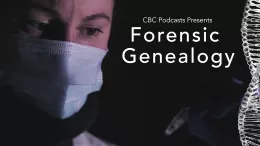
Dr. Nicole Novroski appeared on a CBC podcast to discuss forensic geneaology. She explained how cold case murders, sexual assaults, and unidentified person cases once thought unsolvable are being cracked thanks to the proliferation of retail DNA kits and public genetic databases and what this could mean for the future of cold case investigations. (Posted December 9, 2019)
Professor Sarah Hillewaert gave a lecture at the University of Michigan about her new book entitled “Morality at the Margins: Youth, Language, and Islam in Coastal Kenya”. The talk was cosponsored by the University of Michigan's Muslim Studies Program, Department of Anthropology, African Studies Center, and James Madison College. (Posted November 15, 2019)
Dr. Rosenberg Larsen recently published an article in The Kennedy Institute of Ethics Journal entitled: "Psychopathy Treatment and The Stigma of Yesterday's Research". The editor Sandra L. Borden describes this contribution as challenging "the conventional wisdom of the medical establishment". In his article, Dr. Rosenberg Larsen documents how psychopathy assessments are used to discriminate people from treatment and rehabilitation efforts, a medically erroneous practice allegedly rooted in a history of misleading research. Instead, Dr. Rosenberg Larsen points to research that suggests that so-called psychopaths can gain from treatment/rehabilitation programs with similar success rates compared to non-psychopathic offenders. Larsen, R. R. (2019). Psychopathy Treatment and the Stigma of Yesterday’s Research. Kennedy Institute of Ethics Journal 29(3), 243-272.
This article also figured as a chapter in a recent book publication by Routledge, "Ethics and Errors in Medicine": Larsen, R. R. (2019). “Psychopathy Treatment and the Stigma of Yesterday’s Research”. In Allhoff, F. and Borden, S. (eds.), Ethics and Error in Medicine. New York: Routledge. (Posted November 15, 2019)
Dr. Rosenberg Larsen figured in various outreach publications. In an article in The Etobicoke Guardian, Dr. Rosenberg Larsen was interviewed about the phenomenon of so-called con-artists. A similar interview was conducted by UTM student magazine The Medium. Finally, a portrait of Dr. Rosenberg Larsen's research interests was published on the UTM News website. (Posted November 15, 2019)
Professor Sarah Hillewaert was awarded the UTM Annual Research Prize in the Social Sciences for her outstanding contributions to her field in the areas of how young people negotiate social relations and positions in contexts of social change and globalization. (Posted October 21, 2019)
Dr. Madeleine Mant is the lead author of a paper concerning perimortem hip fractures in the Terry Anatomical Collection (Smithsonian Institution) which suggests that eburnation should be added to the list of perimortem fracture identification criteria. The paper appears in the International Journal of Paleopathology. (Posted October 7, 2019)
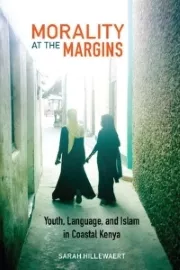
Professor Sarah Hillewaert’s book Morality at the Margins: Youth, Language, and Islam in Coastal Kenya is expected to be released in early November and is now available for pre-order. Her ethnography documents the everyday life of Muslim youth living along East Africa’s coast. Using a linguistic anthropological approach, Prof. Hillewaert documents how young Muslims negotiate changing understandings of morality through everyday practices, including ways of speaking, modes of dress, and bodily practices. (Posted October 7, 2019)
Professor David Samson was awarded the CSS Roger Broughton Young Investigator Award 2019 at the World Sleep Society Conference in Vancouver. (Posted September 30, 2019)
Frida Lona-Durazo, a Ph.D. student in Prof. Esteban Parra’s research group, has published a meta-analysis of genome-wide association studies that provides new insights on the genetic architecture of skin pigmentation in recently admixed populations. The article has been published in the journal BMC Genetics. (Posted August 16, 2019)
Prof. Esteban Parra and his colleagues from Mexico have collaborated with researchers throughout the world in a large study that identified genetic markers associated with childhood obesity. This research uncovered a previously undescribed variant. Additionally, the study narrowed down the causative variants at four known loci to less than ten polymorphisms. This article has been published in the journal Human Molecular Genetics. (Posted August 16, 2019)
Dr. Rosenberg Larsen and colleague, Dr. David Sackris (Arapahoe Community College), recently published an article in The Journal of Value Inquiry critiquing a well-known philosophical theory that defines "aesthetic experience". David Sackris & Larsen, R. R. (2019). A Consideration of Carroll's Content Theory. The Journal of Value Inquiry, 1-13. (Posted August 16, 2019)
Dr. Rosenberg Larsen and colleague, Dr. Janna Hastings (University College London), recently presented a research project they have been working on for the past year at various conferences in Europe. In this work they propose a novel method to expand, standardize, and bring semantic coherence to the terminology used to describe symptoms in psychiatric diagnostics; a recurring problem in the attempt to facilitate accurate and reliable data annotation, as well as interdisciplinary research integration in mental health research. The project is titled: "Mapping the Patient's Experience: An Applied Ontological Framework for Phenomenological Psychopathology".
- 25-27 April: Nordic Society for Phenomenology (NoSP) 2019 annual meeting, University of Copenhagen.
- 4-6 June: San Raffaele Spring School of Philosophy 2019 (SRSSP 2019), San Raffaele University.
- 14-16 June: Swedish Congress of Philosophy (Filosofidagarna), University of Umeå.
(Posted August 16, 2019)
Professor Lauren Schroeder is a co-author of a paper that reviews the morphological and genetic evidence of hybridization across several organisms, and how this evidence can inform studies of hybridization in human evolution. The paper was just published in Evolutionary Anthropology. (Posted June 21, 2019)
Prof. Gary Crawford and Prof. David Smith just returned from China where they are investigating the shift to rice agriculture in Zhejiang Province. Hosted by Fudan University in Shanghai they documented a collection of pottery Crawford and colleagues recovered from the Huxi site (9000-8500 years old) in 2017. Read more about their research trip. (Posted June 20, 2019)
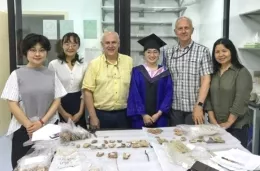
The team at Fudan University.
Prof. Sarah Hillewaert is spending the summer months in Kenya, conducting preliminary research for a new project that focuses on a new trend in Eastern Africa: wellness voluntourism. In particular, she explores how American and European yoga practitioners promote yoga and broader ‘alternative lifestyles’ among remote communities in Coastal Kenya, as a new form of development that Kenyans need. In doing so, she hopes to examine how discourses of secular spirituality, proper bodily disposition, and mindful living are linked to notions morality, development, and progress. (Posted June 20, 2019)
Dr. Nicole Novroski and colleague, Dr. Frank Wendt (Yale University), recently published an article in Forensic Science International: Genetics discussing identity informative SNP associations with heritable trait phenotypes. (Posted June 19, 2019)
Dr. Carolan Wood and coauthors, led by Dr. Laura Lockau (McMaster University), published an article in the Journal of Anthropological Archaeology, which takes the innovative step of considering individuals of all age groups and disease states via aspects of a life course perspective in order to shed light on biocultural factors contributing to vitamin D deficiency in the Roman period assemblage from Isola Sacra, Italy (1st–3rd century AD). (Posted June 19, 2019)
Dr. Carolan Wood and colleague Jubal Jamieson (Cayuga, Wolf clan, Haudenosaunee of the Grand River) recently presented at the University of Toronto Teaching and Learning Symposium: Learning Spaces + Places. Their talk 'Making Spaces for Indigenous Perspectives and Teaching Practice’ discussed a critical and authentic approach to decolonizing the curriculum by the participation of Indigenous educators to explicitly connect Indigenous perspectives and knowledge to bioanthropological theory and practice. View the full program. (Posted June 19, 2019)
Primates that keep erratic schedules tolerate sleep loss better than night-time sleepers.
Professor David Samson's latest latest publication on sleep and cognitive function in lemurs is featured in Nature Research Highlights. Based on these findings, the links between sleep, learning, and memory consolidation appear to be evolutionarily conserved in primates. (Posted May 15, 2019)
Dr. Rosenberg Larsen recently published an article in the European Journal of Analytic Philosophy on how to tackle the prevalence of false-positives in forensic population samples when studying so-called psychopathic personalities: Larsen, R. R. (2018). False-Positives in Psychopathy Assessment: Proposing Theory-Driven Exclusion Criteria in Research Sampling. European Journal of Analytic Philosophy 14(1), 33-52. (Posted April 15, 2019)
Dr. Rosenberg Larsen and colleague, Dr. Janna Hastings (University of Cambridge), recently published an article in Frontiers in Psychiatry proposing a novel method for integrating and synthesizing large, diverse data sets in mental health research. Larsen, R. R. and Janna Hastings (2018). From Affective Science to Psychiatric Disorder: Ontology as Semantic Bridge. Frontiers in Psychiatry, 9(487), 1-13. (Posted April 15, 2019)
Professor Esteban Parra and his collaborators from India, led by Professor Manjari Jonnalagadda, have published the results of a genome-wide association study of skin and iris pigmentation in individuals of South Asian Ancestry. The study, which has been published in the journal Genome Biology and Evolution, identified genetic variants that are associated with variation in skin pigmentation and eye color in South Asia. (Posted April 15, 2019)
Dr. Fukuzawa and Joel Cahn have recently published an article in the International Journal of Information and Learning Technology on the value of technology enhanced learning on the efficiency of problem-based learning. Sherry Fukuzawa, Joel Cahn, (2019) "Technology in problem-based learning: helpful or hindrance?", International Journal of Information and Learning Technology, Vol. 36 Issue: 1, pp.66-76. (Posted April 15, 2019)
Dr. Fukuzawa and Dr. deBraga have recently published an article on the implementation of the Graded Response Method (GRM) in the Journal of Curriculum & Teaching. Their study examined the GRM as an alternative to multiple choice testing in the first year undergraduate course in the Introduction to Biological Anthropology and Archaeology. Sherry Fukuzawa, & Michael deBraga (2019). Graded Response Method: Does Question Type Influence the Assessment of Critical Thinking? Journal of Curriculum & Teaching, 8, 1, 1-10. (Posted April 15, 2019)
Dr. Fukuzawa and Councillor King-Jamieson (Mississaugas of the Credit First Nation) recently presented at the Stage and Places in Education Conference at McMaster University the outcomes of the Symposium on the Importance of Indigenous Education in Ontario Classrooms. (Posted April 15, 2019)
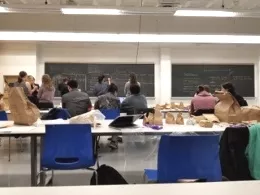
Dr. Carolan Wood presented the following at the University of Toronto Faculty Association’s Challenges and Strengths II: Showcasing the Contributions of Part-timers event at the University of Toronto, Toronto, ON:
Wood C & A Saly. (2019, March). The Collaborative Learning Cemetery Project.
Wood C. (2019, March). Contributing to an Indigenous Curriculum: Incorporating Indigenous perspective and pedagogical practice in the classroom.
(Posted April 12, 2019)
Professor Lauren Schroeder presented at the American Association of Physical Anthropologists meeting last week and received a travel grant from eLife. The title of her presentation was “The path to Homo, revisited”. (Posted April 3, 2019)
Professor Lauren Schroeder has two book chapters in press:
Ackermann, R.R. & Schroeder, L. (2019) The emergence of complexity and novelty in the human fossil record. In “Theology and Evolutionary Anthropology: Dialogues in Wisdom, Humility and Grace.” Eds. A. Fuentes and C. Deane-Drummond. Routledge. In press.
Hlazo, N, Schroeder, L., Ritzman, T. & Ackermann, R.R. (2019) The role of selection in shaping the cranio-mandibular morphology of Paranthropus. In “The Forgotten Lineage(s): Paleobiology of Paranthropus.” Eds. P Constantino and B Wood. Springer Press. In press.
(Posted April 3, 2019)

Professor Todd Sanders spoke at Indiana University on 'Trustworthy knowledge? Social Sciences, Public Policy and Global Environmental Change.’ The talk was part of his collaborative research project with Professor Elizabeth Hall (Dalla Lana School of Public Health, University of Toronto). The event was jointly sponsored by the Departments of Anthropology and Geography. (Posted March 26, 2019)
Emma Yasui, along with Sarah Ranlett, Parth Champaneri, Ibrahim Majoub (under the supervision of Dr. Peterson and Dr. Fukuzawa) gave a presentation at the UTM Digital Humanities Conference on the Virtual Mystery custom web-tool as an example of a collaborative cross-disciplinary project to innovate student engagement in large classes. (Posted March 26, 2019)
Dr. Fukuzawa with Councillor King-Jamieson and Dr. Laliberte were recently awarded a Connaught Community Connections grant (worth $76,000) to facilitate the course “Anthropology and Indigenous Peoples of Turtle Island (in Canada) ANT241H” and run a three year mixed methods longitudinal study on Indigenous cultural competence in students. (Posted March 26, 2019)
Dr. Fukuzawa and Councillor King-Jamieson recently attended the SSHRC funded National Dialogue on Indigenous Research Methodology in Ottawa. Our team (including Dr. Laliberte, and Dr. Grey) submitted a policy paper on the outcomes of the Symposium on the Importance of Indigenous Education in Ontario classrooms. The policy paper included a series of Calls to Action regarding funding for Indigenous pedagogy. (Posted March 26, 2019)
Dr. Tracey Galloway is part of a team recently awarded $74,000 from the Centre for Global Engineering’s Reconciliation Through Engineering Initiative to support research on optimizing transportation networks serving remote, northern Indigenous communities. The group includes Dr. Michael J. Widener, Department of Geography and Planning; Dr. Shoshanna Saxe, Dr. Chi-Guhn Lee and Dr. Chris Beck from the Faculty of Applied Science and Engineering; and Dr. GWK Moore, Chemical and Physical Sciences, UTM. The project builds on a successful collaboration between Anthropology, Geography and Engineering previously funded through the University’s XSeed Program and co-led by Drs. Galloway and Saxe. (Posted March 22, 2019)
Professor Esteban Parra is a co-author of an article that explored the association of genes with cardiometabolic traits, including blood lipids, body mass index, blood pressure and fasting glucose and insulin, using a large dataset with information for more than 15,000 individuals of diverse ancestry. The authors identified several novel gene-trait associations. The article was published in the journal Human Molecular Genetics. (Posted March 20, 2019)

Professor Esteban Parra is a co-author of an article evaluating the usefulness of a panel of Single Nucleotide Polymorphisms (SNPs) for forensic applications. Forensic analyses are typically carried out using genetic markers called Short Tandem Repeats (STRs), but these markers often cannot be used when DNA is degraded. In these cases, SNPs have advantages over STRs, and in this article the authors show that the panel SNPforID 52-plex is highly informative for forensic applications. The article has been published in the journal Forensic Science International: Genetics. (Posted March 20, 2019)
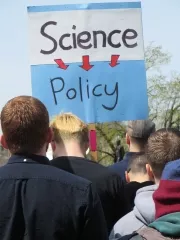
Professor Todd Sanders gave the Keynote Lecture – “Uncomfortable Grounds: Some Thoughts on Trump, Marching for Science and Climate Change” – at the McMaster Anthropology Society Annual Symposium (March 11, 2019). The talk drew from his collaborative research with Professor Elizabeth Hall (Dalla Lana School of Public Health, University of Toronto) on global change science and policy. (Posted March 20, 2019)
Dr. Trevor Orchard, in collaboration with researchers from several other Ontario institutions, have published a preliminary examination of trends in fishing across southern Ontario over much of the last 1000 years. This research highlights variations in fishing focus and intensity across both time and space. The article has been published in the Journal of Archaeological Science: Reports. (Posted March 18, 2019)

Graduate students Melissa Bernard and Elisabeth Cuerrier-Richer created a student-led academic group called Canadian Universities for Forensic Science (CUFFS), which is dedicated to connecting scholars in forensic sciences across Canada. The first edition of their conference, entitled Promoting Collaboration, will take place at the University of Toronto Mississauga on April 5th, 2019. (Posted March 4, 2019)
Professor Stephen Scharper is co-author of an article examining the work of a variety of faith-based organizations (FBOs) doing environmental work in Canada. The article is published in in Worldviews: Global Religions, Culture, and Ecology. (Posted February 28, 2019)
Professor Jack Sidnell is organizing an international workshop on the The Anthropology of Language in Mainland Southeast Asia with N.J. Enfield (U. Sydney) and Charles Zuckerman (U. Sydney). The workshop will take place at the University of Sydney in August 2019. (Posted February 19, 2019)
Professor Jack Sidnell will be presenting a paper as a keynote speaker at the workshop on Language and social hierarchy: Address and self-reference practices in Southeast Asia. The workshop will take place at the University of Sydney in June 2019. View the workshop poster (PDF). (Posted February 19, 2019)
Professor Jack Sidnell will be presenting a paper as a keynote speaker at the Diversity and Inclusion conference at the University of Bologna, Italy in February 2019. The title of his presentation is “Linguistic diversity and interlocutor reference". (Posted February 19, 2019)
Dr. Trevor Orchard and his research collaborators examine the pre-contact history of the eulachon fishery on the northern Northwest Coast of North America through multiple lines of evidence: zooarchaeological, ethnographic, and oral historical. Their results show that, though eulachon and other smelt taxa are often under-represented archaeologically, there is a deep history to the eulachon fishery in the region. The article has been published in the Journal of Archaeological Science: Reports. (Posted January 2019)

Professor Esteban Parra and his graduate student Frida Lona-Durazo are two of the co-authors of a comprehensive review of the evolution and genetic basis of human skin pigmentation, which has been published in the Yearbook of Physical Anthropology. (Posted January 2019)

Professor Esteban Parra and his research collaborators from Mexico participated in a large study evaluating genetic factors that may be involved in estimated glomerular filtration rate (eGFR), a biomarker of Chronic Kidney Disease. The study, which included more than 300,000 individuals of diverse ancestry, identified many genetic variants involved in eGFR, and defined novel molecular mechanisms and putative causal genes for this trait. The article has been published in Nature Communications. (Posted January 2019)
Professor David Samson and his research collaborators discovered that, relative to cathemeral lemurs, diurnal lemurs were characterized by the deepest sleep and exhibited the most disruptions to normal sleep‐wake regulation when sleep deprived. The article has been published in the Symposium Set: Primate Sleep: American Journal of Physical Anthropology. (Posted January 2019)
Professor David Samson and Charles L. Nunn discovered that humans pack an unexpectedly higher proportion of REM sleep within a shorter overall sleep duration, and do so by reducing NREM sleep. The article has been published in the Symposium Set: Primate Sleep: American Journal of Physical Anthropology. (Posted January 2019)
